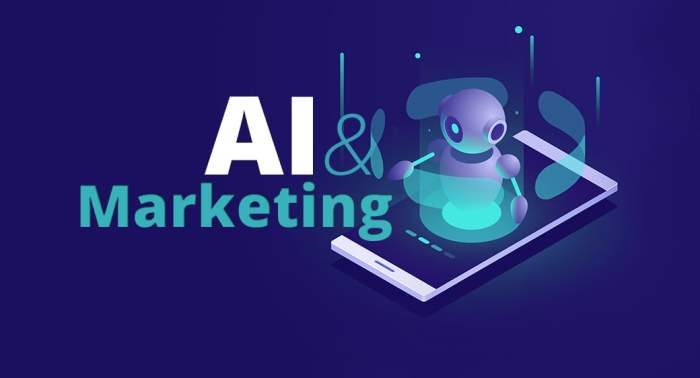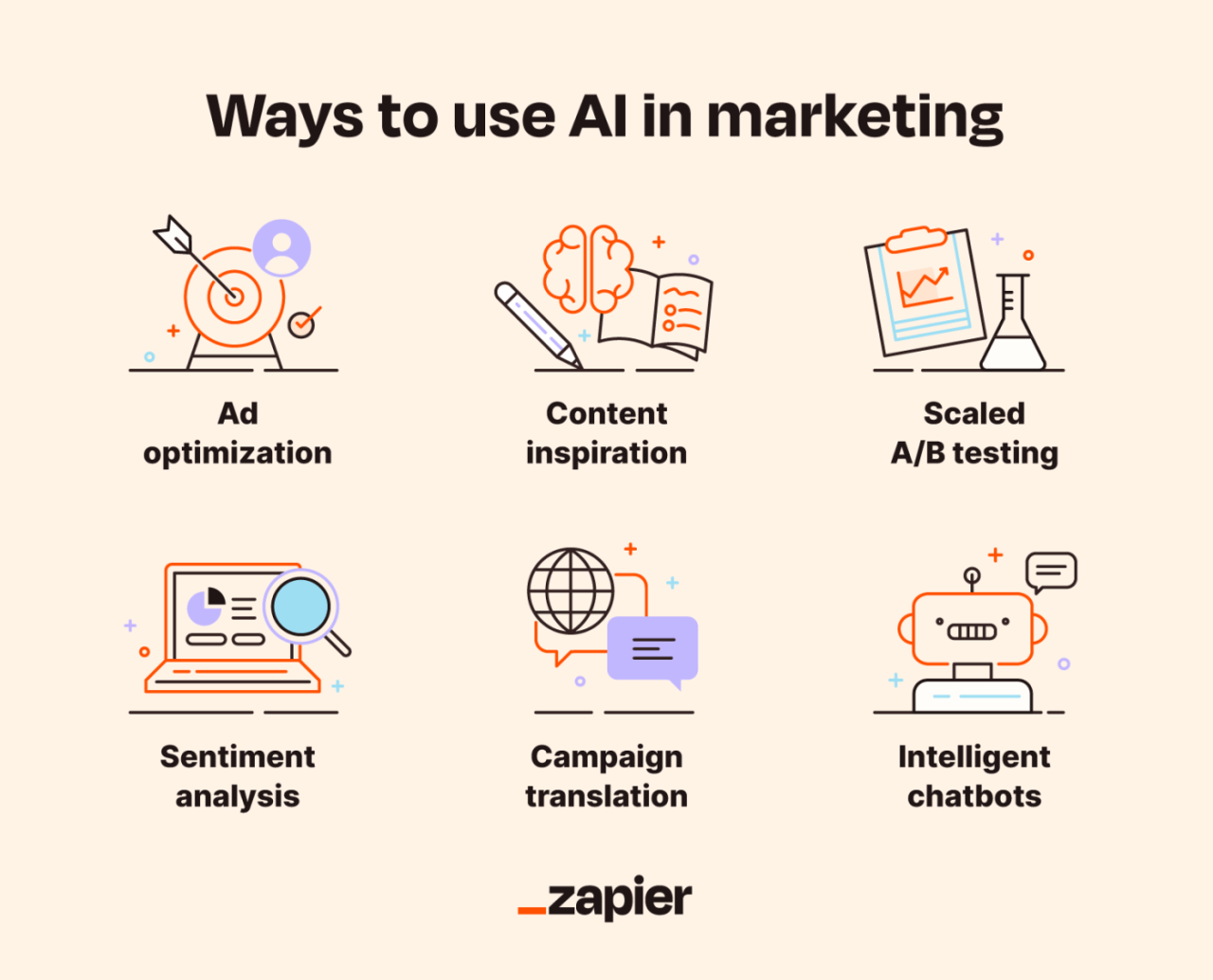Using AI in Marketing takes center stage, inviting readers into a world where technology meets creativity, shaping the future of marketing strategies with precision and innovation. From personalized campaigns to predictive analytics, AI is redefining the way businesses connect with their audience.
Introduction to AI in Marketing
AI, or Artificial Intelligence, plays a vital role in revolutionizing the marketing industry by enabling businesses to analyze data, predict consumer behavior, and personalize marketing strategies.
Benefits of Using AI in Marketing Strategies
Implementing AI in marketing strategies offers numerous advantages, including:
- Enhanced customer segmentation and targeting based on data analysis and insights.
- Automation of repetitive tasks, such as email marketing and social media management, saving time and resources.
- Personalized customer experiences through AI-powered chatbots and recommendation engines.
- Improved campaign performance and ROI with predictive analytics and optimization.
Examples of How AI is Transforming the Marketing Industry
AI has already made a significant impact in marketing, with examples such as:
- Netflix using AI algorithms to recommend personalized content to users based on their viewing habits.
- Amazon leveraging AI for product recommendations and targeted advertising to enhance customer experience and drive sales.
- Google utilizing AI-powered search algorithms to deliver more relevant search results to users.
Personalization in Marketing with AI

Personalization in marketing with AI allows companies to tailor their campaigns to individual customers, increasing engagement and conversions. By leveraging AI tools, businesses can analyze customer data to create targeted and relevant marketing strategies.
AI Tools for Customer Segmentation
AI tools such as customer relationship management (CRM) software, predictive analytics, and machine learning algorithms are commonly used for customer segmentation. These tools help businesses group customers based on factors like demographics, behavior, and preferences, allowing for more personalized marketing efforts.
- CRM software: CRM platforms like Salesforce and HubSpot use AI to segment customers based on their interactions with the company, helping businesses understand their needs and preferences.
- Predictive analytics: Predictive analytics tools analyze historical data to predict future customer behavior, enabling companies to target specific customer segments with personalized offers.
- Machine learning algorithms: Machine learning algorithms can analyze large volumes of data to identify patterns and trends, helping businesses segment customers more effectively and deliver personalized marketing messages.
By using AI tools for customer segmentation, businesses can create targeted marketing campaigns that resonate with individual customers, leading to higher engagement and conversion rates.
Predictive Analytics and AI in Marketing
AI plays a crucial role in predictive analytics within marketing by utilizing machine learning algorithms to analyze data and predict future outcomes. This allows businesses to make informed decisions based on data-driven insights rather than relying solely on intuition.
How AI is Used for Predictive Analytics in Marketing
Predictive analytics with AI involves collecting and analyzing large amounts of data to identify patterns and trends. Machine learning algorithms are then used to make predictions about customer behavior, market trends, and campaign performance. By leveraging AI, marketers can anticipate customer needs, personalize marketing strategies, and optimize campaigns for better results.
Advantages of Using AI-Driven Predictive Analytics for Marketing Decisions
- Improved Decision-Making: AI-driven predictive analytics provide marketers with valuable insights that can lead to more effective decision-making processes.
- Enhanced Customer Experience: By predicting customer behavior, businesses can create personalized experiences that cater to individual preferences and needs.
- Increased ROI: Predictive analytics can help optimize marketing campaigns, leading to higher return on investment and better overall performance.
- Forecasting Market Trends: AI can analyze market data to forecast trends, allowing businesses to stay ahead of the competition and adapt their strategies accordingly.
Automation in Marketing Processes: Using AI In Marketing

Automation plays a vital role in streamlining marketing tasks, allowing businesses to focus on strategy and creativity rather than repetitive manual work. AI technology has revolutionized marketing automation, providing advanced tools to optimize campaigns and enhance customer engagement.
Automating Email Campaigns
- Email marketing is a key component of any marketing strategy, but managing large email lists and crafting personalized messages can be time-consuming. AI-powered tools like Mailchimp and HubSpot automate email campaigns by analyzing customer data, segmenting audiences, and sending targeted messages at optimal times.
- AI algorithms can also predict customer behavior and preferences, allowing marketers to create hyper-personalized emails that resonate with recipients. By automating the email marketing process, businesses can increase open rates, click-through rates, and conversions while saving time and resources.
Social Media Scheduling and Posting
- Social media management involves creating and scheduling posts across multiple platforms, monitoring engagement, and analyzing performance metrics. AI tools such as Hootsuite and Buffer automate the scheduling and posting of social media content, optimizing posting times based on audience behavior and engagement patterns.
- AI algorithms can analyze social media data in real-time, allowing marketers to track trends, identify opportunities for engagement, and adjust their social media strategy accordingly. By automating social media tasks, businesses can maintain a consistent online presence and drive meaningful interactions with their audience.
Efficiency and Cost-Effectiveness
- Using AI for marketing automation improves efficiency by reducing manual labor, minimizing errors, and accelerating campaign deployment. Marketers can focus on strategy and creativity while AI handles repetitive tasks, resulting in more effective campaigns and better ROI.
- AI-powered tools are cost-effective in the long run, as they enable businesses to reach a larger audience, drive engagement, and generate leads without the need for extensive human intervention. By leveraging AI technology for marketing automation, companies can achieve significant savings and maximize their marketing efforts.
AI for Content Creation and Optimization
AI tools play a crucial role in revolutionizing content creation and optimization in marketing. These tools utilize advanced algorithms and machine learning to generate engaging content that resonates with the target audience. Additionally, AI helps in optimizing content for search engines to improve visibility and ranking on search result pages.
AI Platforms for Content Generation
AI platforms like Wordsmith, Articoolo, and Quill are examples of tools that assist marketers in creating compelling content. These platforms use natural language generation (NLG) technology to produce human-like text that is tailored to specific audiences. By analyzing data and trends, AI can generate personalized content at scale, saving time and resources for marketers.
AI in Content Optimization
AI plays a vital role in enhancing strategies through content optimization. By analyzing s, user behavior, and search patterns, AI tools can recommend relevant topics, optimize meta tags, and improve overall content quality. This results in better visibility and higher organic traffic, ultimately boosting a website’s ranking on search engines.
Ethical Considerations in AI Marketing
In today’s digital age, the use of AI in marketing has raised ethical concerns that need to be addressed to ensure responsible and transparent practices. Let’s delve into the ethical implications of leveraging AI in marketing strategies.
Data Privacy
Data privacy is a major concern when it comes to using AI in marketing. With the vast amount of data collected and analyzed by AI algorithms, there is a risk of infringing on consumer privacy rights. Marketers need to prioritize data protection measures and obtain consent before using personal data for targeted advertising.
Transparency
Transparency is crucial in AI marketing to build trust with consumers. It’s essential to be transparent about the use of AI algorithms in marketing campaigns and provide clear explanations of how data is being collected, analyzed, and utilized. Marketers should ensure transparency in their practices to maintain credibility and integrity.
Bias in AI Algorithms, Using AI in Marketing
One of the most significant ethical challenges in AI marketing is bias in algorithms. AI systems can unintentionally perpetuate biases present in the data used to train them, leading to discriminatory outcomes. Marketers must regularly monitor and evaluate AI algorithms to mitigate bias and ensure fairness in targeting and decision-making processes.
Best Practices for Ethical AI Usage
To ensure ethical AI usage in marketing strategies, marketers should prioritize the following best practices:
- Implementing strict data privacy policies and obtaining explicit consent for data usage.
- Providing transparency in AI-driven processes and decision-making to build trust with consumers.
- Regularly auditing AI algorithms for bias and taking corrective actions to mitigate discriminatory outcomes.
- Engaging in ongoing education and training on ethical AI practices to stay informed and compliant with regulations.
